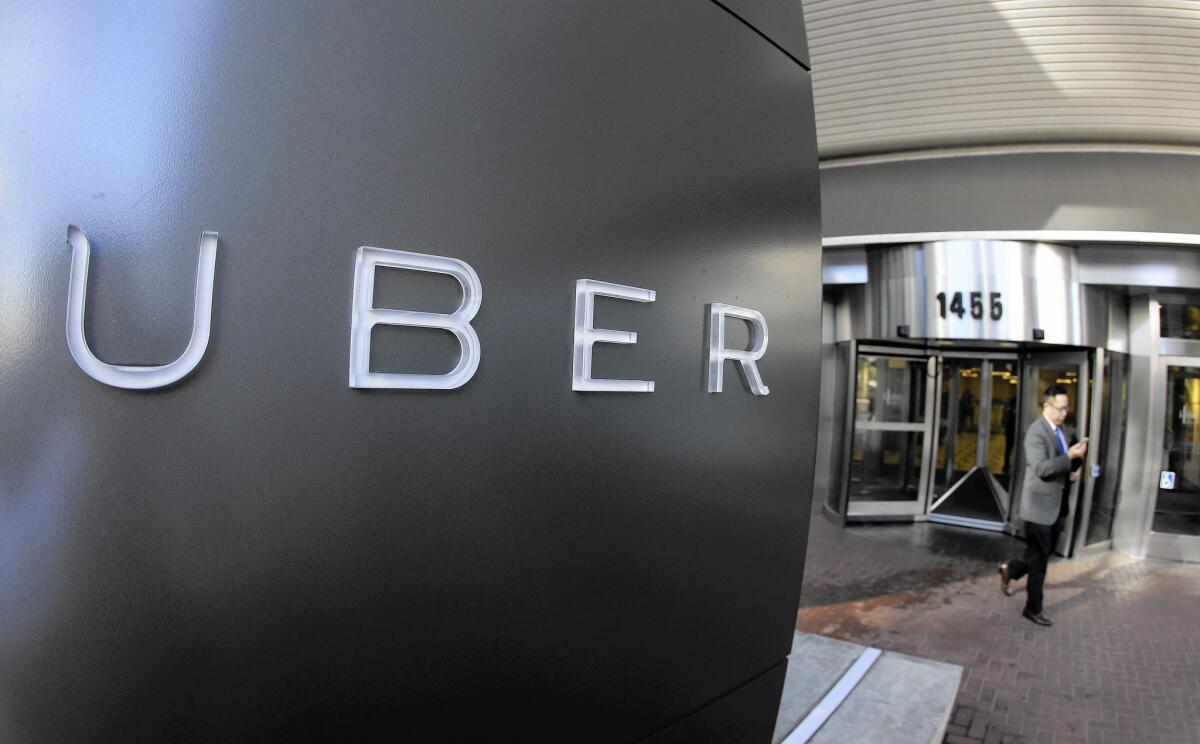California senator with ties to taxi industry takes on surge pricing by Uber and Lyft

Uber’s headquarters in San Francisco are shown.
Reporting from Sacramento — State Sen. Ben Hueso (D-San Diego) wants California to take an active role in setting customer prices for Uber, Lyft and other rideshare companies. His bill sailed through the Senate committee he leads Tuesday, ratcheting up a fight between the popular tech companies and those who believe the industry needs more regulation.
SB 1035 is one of the Capitol’s biggest broadsides against Uber and Lyft this year, taking aim at the core of the companies’ business model -- the ability to lower prices when demand is low and hike them at times of high demand.
Hueso said he was concerned for consumers and workers. It isn’t fair, he said, for a couple to pay $10 for a ride to a restaurant, then face a $60 bill on the way back. The state also should protect drivers from receiving rates that are too low.
See the most-read stories this hour >>
“There’s gotta be a way to allow some flexibility in the pricing but also to allow some guarantee to the drivers that they’re going to make some kind of profit,” Hueso told the Senate’s Energy, Utilities and Communications Committee, which he chairs.
Hueso insisted that his bill doesn’t give state regulators the ability to fix prices for ridesharing companies, but simply restates their authority to do so. Indeed, the California Public Utilities Commission, which currently regulates rideshares, already can do it under the law.
But before Hueso’s bill, no one had formally been pushing the agency to take such a step. Tech advocates testified at Tuesday’s hearing that the bill would, in fact, lead to state regulation over prices.
“The thought that we would be fixing prices for these companies is very dangerous from our perspective because that would upend the business model,” said Robert Callahan, who leads the Internet Assn. advocacy group in California.
Aside from rate setting, Hueso’s bill would encourage regulators to beef up restrictions on background checks for rideshare drivers and insurance requirements, and allow local police to enforce state rules on rideshares, among other changes.
“It’s completely transparent that this is an attack on the industry,” Callahan said after the hearing.
That Hueso’s bill passed out of the committee he chairs isn’t a surprise. Two Republican senators, Mike Morrell of Rancho Cucamonga and Anthony Cannella of Ceres, were opposed.
Its advancement sets up a fight between power players over the big policy question of how much the state should regulate ridesharing companies. Hueso has long and deep ties to the taxi industry and has taken numerous steps to add regulations to rideshares while blocking efforts to ease them. Meanwhile, Uber alone has spent millions in lobbying over the last few years.
Twitter: @dillonliam
ALSO:
How a state senator — whose family is in the taxi business — put the brakes on two Uber bills
Lawmaker who wants more rideshare regulation says he’s going to fail
Facing regulatory roadblocks, Uber ramps up its lobbying in California
More to Read
Get the L.A. Times Politics newsletter
Deeply reported insights into legislation, politics and policy from Sacramento, Washington and beyond. In your inbox three times per week.
You may occasionally receive promotional content from the Los Angeles Times.











